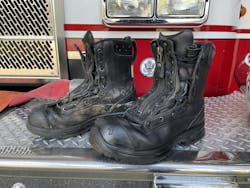101 Probie Etiquette and Behavior Tips for Success
The fire service, as with industry sectors, is ever-changing with its surroundings. One of the biggest changes that we face today is the influx of new recruits, as we see our more experienced members retire in large swaths.
Many new recruits didn’t grow up with family members who were in the fire service, so prospects enter the workforce with no knowledge of what to expect or what’s expected of them. As a result of this generation gap, the new generation is losing decades of knowledge, simply because there isn’t enough time to learn absolutely everything.
One of the greatest lessons that’s being lost to time is the art of earning trust, which is fundamental to every member of a successful fire department. The best thing that probationary firefighters, or “probies,” can do for themselves is to demonstrate to their department their dependability and trustworthiness from the start. After all, that’s what matters in times of crisis.
The probationary period in any fire department is mostly viewed as the working interview, when the probie demonstrates his or her ability to integrate into the team environment. Whether probies realize it or not, they are being evaluated on dedication to the job and to the crew as well as physical, mental and emotional aptitude and resilience in times of adversity and opportunity.
Outside of the job, it’s important for probies to learn to take care of themselves and their relationships, so they don’t need to fix a situation that could have been prevented from the beginning.
In no particular order, here are 101 tips on shaping your behavior as a probationary firefighter to set yourself up for a great career.
1. Always thank the chef for dinner, even when you helped cook it.
2. Always be open to learning the same thing from a different person.
3. Adjust your day-to-day operations to the expectations of the strictest officer.
4. Be gritty in adversity and graceful in opportunity.
5. Never complain about having to do work.
6. When in doubt, bring the extra tool.
7. If a retiree visits, give that person your full respect and attention.
8. Learn to shower quickly.
9. You’re new. No one expects you to be great immediately. Show them how great you can be.
10. Develop a filter. Not everything that enters your mind needs to come out of your mouth.
11. Always accompany your driver when that person fuels up the rig.
12. If members go to a big job but you aren’t assigned, listen to the radio and be ready for when they return.
13. Leave every room that you enter better than how you found it.
14. When members of the department are in need, support the mission in helping them.
15. Mistakes are OK. Own up to them and learn from them.
16. Assume recliners are off limits.
17. If there’s a conversation that you don’t like, you have two options: Say nothing or walk away from it.
18. Unless you are on a call or at company training, always help with cooking.
19. If you aren’t cooking, at least do dishes for the chef.
20. Assume that every ounce of lenience that’s given is either a privilege or a test. Use it sparingly or not at all.
21. If you choose to wear a hat on duty, remove it when you sit at the kitchen table and in the classroom and when you talk to an officer at his/her desk.
22. Don’t speak ill of your fellow probies—or anyone for that matter.
23. Give great attention to detail.
24. Avail yourself to training opportunities.
25. Keep at least one pen on you at all times.
26. You may disagree with your union, but don’t make enemies with it.
27. Find your person to relieve as soon as you arrive at the firehouse.
28. If there are dishes in the sink, do something about them.
29. Change radio batteries for your relief.
30. Check your air pack at the start of every tour. Ensure that your bottle is 100 percent full.
31. Train often with other crews.
32. Prove yourself in training and on the fireground, not with war stories.
33. Always offer to help, even when you don’t know what you’re doing.
34. If you don’t know how to do something, speak up.
35. Don’t ask, “Do you need help?” Ask, “How can I help?”
36. If they say, “I don’t need anything,” find something to do that supports the mission.
37. Health is a priority. If you are too sick to do your job, don’t go to work.
38. Act as though someone is paying attention. The important people are.
39. Keep controversial opinions to yourself.
40. Support the in-house ambulance crew even when you aren’t assigned. Get them dispatch times, help them restock, etc.
41. Practice healthy habits and stay fit.
42. Let people learn who you are through your actions.
43. Never take responsibility for the TV remote.
44. If you’re looking for feedback, ask your officer.
45. If you want to practice something, ask someone who you trust for guidance.
46. Designate time for faith, family and friends.
47. Learn something new and practice something old every day.
48. Don’t shy away from dirty jobs.
49. Stay hygienic and hydrate often.
50. Know what’s expected of you and begin to learn what’s expected of the position that’s above you.
51. Think three times before you speak.
52. Ask questions to learn, not to accuse.
53. Surround yourself with knowledge and positivity.
54. Make work a safe haven. Make it a place where you want to be when things get difficult in your personal life.
55. Be in uniform unless in PT or immediately go to bed.
56. Keep your shirt tucked in.
57. If you have a weakness, work to gain mastery.
58. Don’t shy away from funerals details. You aren’t the only one who doesn’t want to be there.
59. Mental health is just as important as physical health. Find yourself a counselor before you need one.
60. Stick with your officer. Learn how that person thinks, so you can learn how to support the mission even when not given a task.
61. Never burn a bridge.
62. Learn the job of the other firefighter on the back step. You might be called on to fill in.
63. Keep your boots clean/polished.
64. If you’re cold, pick up a broom and use it.
65. Thank the people who help you.
66. Be humble but don’t self-deprecate.
67. Gossip is for people who are bored. Keep yourself busy.
68. If you can, sign up for details that have few or no volunteers.
69. Keep bad habits (tobacco/nicotine/gambling) out of work.
70. Start every day with a clean uniform.
71. When you are given a job, YOU are given that job. Do it.
72. Be confident but don’t be a know-it-all.
73. Know every tool that’s in your pocket and know how to use it.
74. Limit your excuses, but when crap happens in your personal life, take care of it.
75. Get your Class A uniform as soon as you can afford to. You never know when you’ll need it.
76. You are on duty until your relief gets a full report from you. Keep yourself and your gear ready to go until then.
77. Be prepared for any cards that you show to be held against you.
78. Dietary restrictions are OK but try not to be picky. Be open to trying new things.
79. If you have pertinent expertise, learn where you might fit into the mission.
80. Laugh and learn through humor/poking fun that’s directed at you.
81. Learn every piece of equipment that’s on your rig as soon as possible.
82. Address officers by their title.
83. Make sure that your rig is squared away after you return to quarters from a call.
84. Do as you’re told. Unless to clarify instructions, save any questions until the task is complete.
85. Learn your alarm assignments but be prepared for different directives.
86. If exercise is new to you, ask someone for guidance.
87. You’re a clean slate. Learn as though you know nothing.
88. If you came from a volunteer department, keep in touch with those folks.
89. Learn how to cook at least five different meals.
90. If you’re unfamiliar with the department’s PPE, learn it fully.
91. Be predictable and reliable.
92. Don’t operate in the gray area. People must trust that you know what’s right and wrong.
93. Never forget the people who helped you get to where you are today.
94. Support your fellow probies. You’re all in the foxhole together.
95. You love this job. Don’t forget to smile.
96. Be willing. Be safe.
97. When a new probie comes in, help that person acclimate to the crew.
98. You aren’t in charge of other probies. You only can lead by example.
99. Never have contempt for other probies for not doing what you consider to be the bare minimum. They might not know any better.
100. When you make it off of probation, don’t let up on the good habits that you learned.
101. If after all of this your values and efforts aren’t appreciated, consider somewhere else where they will be. Know your worth.
About the Author

Emily Crocker
Emily Crocker entered the fire service as a volunteer at the age of 20 while she was pursuing her degree in biological science. During her years of service, she earned certifications in EMT, Instructor 2, Hazmat Technician, Rope Rescue, Cold Water Rescue and Confined Space Rescue. With these certifications, Crocker has worked for five departments (volunteer, part-time or full-time) as a firefighter, driver and lieutenant. She currently holds the position of firefighter/EMT with Navy Region Mid-Atlantic Fire and Emergency Services Submarine Base, New London, in Groton, CT.
